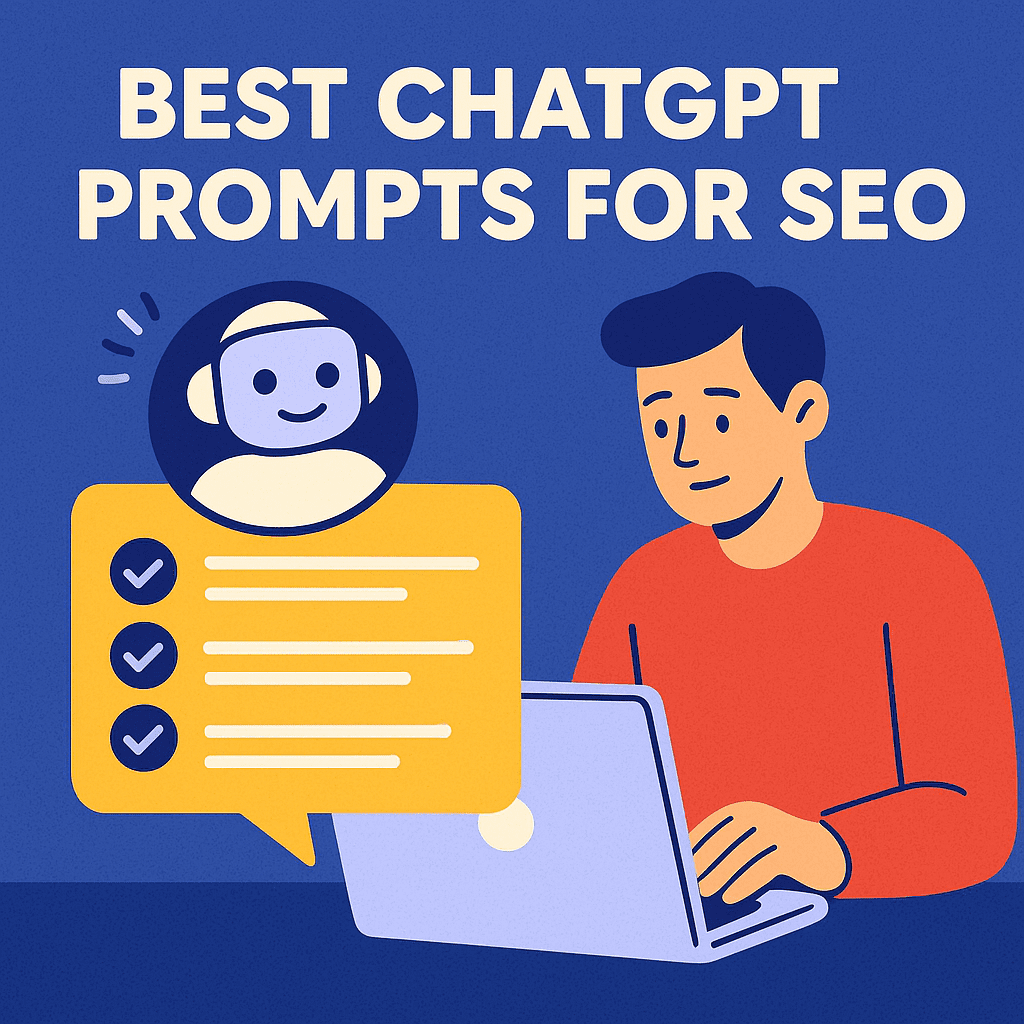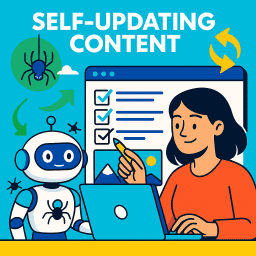Best ChatGPT SEO Prompts for 2025 (50 Expert Examples)
Supercharge your SEO with ready-to-use instructions

🤖 Smarter Prompts = Better SEO: Here’s How to Use ChatGPT Properly
So, are you just asking it to “rewrite this meta title”? Or are you giving it the right instructions to act like a seasoned SEO consultant?
This guide covers 50 expertly crafted prompts to help you get high-quality SEO work done faster – from content briefs to audits, all in a matter of minutes. And the trick to unlocking ChatGPT’s best work? It all comes down to the prompt.
Note: This post highlights just a few SEO areas where prompts can make a big impact – there are many more ways to use ChatGPT across your strategy.
🧠 What Are ChatGPT Prompts for SEO?
A ChatGPT SEO prompt is a carefully written instruction that tells the AI exactly what task you want it to perform. It might be something like:
“Generate 10 keyword variations for a service page about solar panel installation in the UK.”
Think of it like giving a new team member a brief. The more context and clarity you provide, the better the result.
When used well, prompts can help you create optimised content, write compelling metadata, build out structured data, audit competitor content, and much more.
✅ What Makes a Strong SEO Prompt?
- Set the Role: Tell ChatGPT what kind of expert it’s acting as.
- Be Clear on Output Format: Bullet points, table, paragraph – be specific.
- Share Your Goal: Explain what you’re trying to achieve.
- Include Specific Requirements: Tone, format, audience, length, keywords.
- Provide Supporting Material: Competitor URLs, brand guidelines, context.
- Use Examples or Templates: Outline the layout or result you’re looking for.
🚨 Why It Matters
The difference between a weak prompt and a strong one is the difference between low-value content and useful, optimised output. Get your instructions right, and you’ll be saving hours every week while maintaining full control over quality.
It’s not about tricking Google – it’s about working smarter, not harder.
🧐 What About Google’s Rules on AI?
Still worried Google will penalise you for using AI-generated content? You can relax.
Google says: “Our focus is on the quality of content, rather than how content is produced.”
“Appropriate use of AI or automation is not against our guidelines.”
In simple terms: If your content genuinely helps users, you’re playing by the rules.
So keep your prompts focused, your outputs useful, and your intentions honest.
📝 Blog Post Prompts
- Write a 1,500-word blog post on ‘how to reduce energy bills in winter’ aimed at UK homeowners. Use a friendly, expert tone and include subheadings and practical tips.
- Generate a blog outline for a post targeting the keyword ’email marketing trends 2025′ for a B2B SaaS audience.
- Write a blog intro that hooks the reader and includes the phrase ‘best remote working tools’ naturally.
- Create five blog post ideas for a personal finance blog focusing on students living in the UK.
- Draft a blog conclusion for an article on ‘how to clean solar panels’ that encourages readers to contact the company for a free quote.
- Write a blog post answering the question ‘What is bounce rate?’ in under 800 words for a beginner audience.
- Create a how-to guide in blog format for ‘setting up a WordPress SEO plugin’, aimed at small business owners.
- Generate an opinion blog post on the future of electric vehicles in Europe, written from the perspective of a sustainability consultant.
- List 10 blog title variations targeting ‘best meal prep containers’ and include a mix of listicles, how-tos, and comparisons.
- Write a blog post comparing free vs paid website builders for freelancers in the UK, using a neutral tone and structured layout.
📌 Featured Snippet Optimisation Prompts
- Write a 40–50 word answer to ‘What is a sitemap?’ suitable for a featured snippet in UK English.
- Create a step-by-step list that answers ‘How do I register a business in Scotland?’ optimised for position zero.
- Summarise the process of composting food waste into a concise 3-sentence paragraph optimised for featured snippet boxes.
- Generate a ‘people also ask’ style answer for the question ‘Is SEO worth it for small businesses?’ in under 50 words.
- Write a numbered list that explains ‘How to start a podcast’ using simple language for snippet targeting.
🏷️ Title Tag & Meta Description Generation Prompts
- Create an SEO-optimised title tag (max 60 characters) and meta description (max 155 characters) for a page selling bamboo toothbrushes in the UK.
- Generate 5 variations of a homepage meta title and description for a vegan skincare brand, including the keyword ‘cruelty-free skincare’.
- Write a title and description for a comparison blog on ‘freelance platforms for designers’, focusing on CTR.
- Suggest a meta title and meta description for a services page about ‘roof repair in Glasgow’, using a persuasive, local tone.
- Optimise this meta description for higher engagement: ‘We offer reliable dog grooming services in London. Contact us today.’
🔍 Keyword Research for a New Page
- List 10 long-tail keywords related to ‘AI tools for graphic designers’ with search intent explained.
- Generate keyword clusters for a new landing page about electric bike hire in Manchester.
- Give me transactional keywords for a page selling hiking boots in the UK, including estimated search volumes if possible.
- Find content gaps in existing keyword coverage for a personal injury solicitor website in Birmingham.
- Suggest informational keywords for a page about starting a food truck business, and categorise them by awareness stage.
🧩 Schema Markup Creation Prompts
- Generate JSON-LD schema markup for a product page selling noise-cancelling headphones, including review and price info.
- Write FAQPage schema (JSON-LD) for three questions about registering for VAT in the UK.
- Create HowTo schema markup for a guide on ‘how to clean a washing machine’ in JSON-LD format.
- Provide LocalBusiness schema markup for a café in Edinburgh, including opening hours and geo coordinates.
- Create Event schema in JSON-LD for a digital marketing workshop happening in London on 12 November 2025.
🛠️ On-Page Optimisation Prompts
- Rewrite this H1 tag to include the keyword ‘affordable wedding photography’ while sounding natural.
- Suggest internal linking opportunities for a service page about web design for dentists.
- Optimise this paragraph for the keyword ‘best VPN for streaming in the UK’, keeping it natural and informative.
- Improve this bulleted feature list for SEO readability, targeting users searching for ergonomic office chairs.
- Analyse this page and suggest improvements to its H1–H3 heading structure for better SEO clarity.
🧾 Improve Thin Content on Product or Service Pages
- Expand this 40-word product description for a ceramic travel mug into a persuasive 150-word version optimised for SEO.
- Improve this service page for ‘loft conversions in Bristol’ by adding benefits, FAQs, and trust signals.
- Write three unique selling points (USPs) for a page selling home insurance policies in the UK.
- Enhance this short description of a dog walking service in Leeds by including more detail and natural local SEO terms.
- Rewrite this 100-word block of text to sound more engaging and trustworthy, keeping ’emergency plumbing services London’ in mind.
🕵️♂️ Competitor Analysis Prompts
- Compare the homepage copy of three top-ranking competitors for the term ‘luxury kitchen renovation UK’. What do they have in common?
- List the top keywords used by competitors ranking for ‘kids coding classes online’ and identify content gaps.
- Summarise the blog structure and tone used by competitors in the ‘freelance writing tips’ niche.
- Identify potential backlink opportunities based on competitor content about personal branding for consultants.
- Review three competitor FAQ pages in the dog training niche and suggest five new questions we could answer better.
🧠 Bonus: All-Purpose SEO Prompts
- Act as a senior SEO strategist and create a content calendar for a new blog about eco-friendly home improvements.
- Simulate a client pitch explaining why structured data is important for improving search visibility.
- Explain canonical tags in simple terms to a small business owner unfamiliar with SEO.
- Audit this page for duplicate content and make suggestions for making it original without losing keyword value.
- Pretend you are an SEO consultant speaking at a beginners’ workshop. How would you explain E-E-A-T in 2025?
⚡ Final Thought
Want to get real SEO work done with ChatGPT – fast?
This collection of 50 expert-level ChatGPT prompts is designed to save you hours and elevate your SEO game in 2025. From writing blog posts and generating schema markup to fixing thin content and analysing competitors, these ready-to-use prompts turn AI into your smartest team member. Whether you’re a beginner or a seasoned pro, you’ll find practical, results-driven instructions to get high-quality output – every single time.
Because great SEO doesn’t come from generic tools. It comes from asking the right questions.
Also Read:
How to Use ChatGPT for SEO Content, Planning and Strategy
How to Train AI Tools (Like ChatGPT) to Improve Your SEO Workflow
💬 What the Experts Are Saying
“The quality of your prompt determines the value of the output. Treat ChatGPT like a team member – brief it well, and it’ll surprise you.”
“AI won’t replace SEOs, but SEOs who know how to use AI will replace those who don’t.”
“Prompting is the new superpower in digital marketing. Master it, and you’ll leapfrog your competition.”
“ChatGPT is brilliant – but blind. The prompt is its lens. If you don’t tell it where to focus, you’ll get a blurry result.”
❓ ChatGPT + SEO: Frequently Asked Questions
Can ChatGPT write SEO-optimised blog posts for my business?
Yes, ChatGPT can generate well-structured blog posts using clear instructions about tone, target audience, keywords, and word count. The better the prompt, the better the output.
How do I prompt ChatGPT to write meta descriptions that increase clicks?
Use prompts like: “Write an SEO-optimised meta description (max 155 characters) for a UK page selling eco-friendly office chairs. Focus on benefits and urgency.”
What’s the best way to get ChatGPT to help with keyword research?
You can ask ChatGPT to generate long-tail keyword lists by providing a topic, target location, user intent, and content type. Pair it with manual verification tools for accuracy.
Is ChatGPT reliable for generating structured data like schema markup?
Yes, especially with the right format. You can ask it to write JSON-LD for FAQ, How-To, Product, or LocalBusiness schema by giving it the necessary details.
Can I use ChatGPT to audit competitor content for SEO gaps?
Absolutely. Provide competitor URLs or paste in their text and ask ChatGPT to identify gaps, tone differences, missing keywords, or opportunities for differentiation.
How can I make ChatGPT act like an SEO consultant?
Start your prompt with: “You are a senior SEO consultant with 10 years of experience…” and explain your goal. This sets the tone and context for expert-level responses.
Will Google penalise my site for using AI-generated SEO content?
No. Google has confirmed that AI-generated content is fine as long as it is useful, original, and not made purely to manipulate search rankings.
Can ChatGPT create SEO content that follows E-E-A-T principles?
Yes, but you must guide it to include first-hand experience, expert tone, credibility markers, and trustworthy sources to align with E-E-A-T best practices.
What’s a good prompt to generate internal linking ideas with ChatGPT?
Example: “Suggest internal linking opportunities for a blog post about local SEO for cafés in London. Use a friendly tone and provide anchor text suggestions.”
Can ChatGPT improve thin product descriptions for SEO?
Yes, you can ask it to expand short descriptions into 150+ words using persuasive copy, local relevance, features, benefits, and keywords for better SEO and conversions.
Video Recap – 50 ChatGPT Prompts Every SEO Should Use
Are you ready to supercharge your SEO workflow? In this video, we dive into 50 expert-tested prompts for ChatGPT that will help you streamline keyword research, content creation, on-page optimisation, technical SEO tasks and more.

















